Shows

Thriving Minds with Alberto ZandiMIT Neuroscientist: How to Wire Your Brain for Optimism Today - Dr Tali SharotThis week Alberto sat down with Dr Tali Sharot, one of the world’s leading cognitive neuroscientists, Professor at MIT and UCL, and a global authority on optimism, decision making, memory, and influence.Dr Sharot’s research challenges the idea that humans are rational decision makers. Instead, she explains how optimism bias, emotion, and anticipation shape the choices we make, the memories we form, and the way we respond to information.This episode turns complex neuroscience into practical insight that applies to work, relationships, learning, and everyday life.You will lear...
2026-01-291h 37
The Giants Shoulder#83 Meet The Leading Behavioural Change Neuroscientist for 2026Dr. Tali Sharot is a cognitive neuroscientist and director of the Affective Brain Lab, whose research reveals the hidden rules that actually change human behavior, beliefs, and motivation.Most people think facts and logic should be enough to persuade someone, quit a bad habit, or finally convince their dad to exercise. But the brain doesn’t work like that. In this episode, Tali explains why our “priors” and identity make beliefs stubborn, why emotion and storytelling sync brains in a way statistics can’t, and why the real driver of change isn’t knowledge, it’s incentives, rewards, and habit format...
2026-01-051h 16
Balkon Konuşmaları Podcast“Kanıtlar İnancı Değiştirir mi?” (Tali Sharot Serisi / Bölüm 1)Bu bölümde Tali Sharot’un Başkalarının Aklı kitabının ilk bölümünden yola çıkarak basit bir sorunun peşine düşüyorum: İnsanlar yeni bilgilerle gerçekten fikir değiştirir mi? Kanıtlar, gerçekler ve veriler neden çoğu zaman ikna etmeye yetmez? Balkon Konuşmaları’nda bu bölüm, inançların nasıl oluştuğunu ve neden bu kadar dirençli olduklarını anlamaya çalışıyor.#BalkonKonuşmaları #BaşkalarınınAklı #TaliSharot #İnanç #İkna
2025-12-2809 min
Artificial Happiness: Fulfilment in the Age of AI#148 – Why We Stop Noticing Joy (And How to Get It Back) | Tali SharotWhat if the secret to happiness isn’t finding more pleasure, but learning how to keep feeling the pleasure you already have? Neuroscientist Tali Sharot reveals why our brains are wired to stop noticing the good...
2025-10-2435 min
Jovana MiljanovicE338 Tri razloga zašto verujem u grupni radPrijava za Biznis bazu:https://forms.gle/AWVLxYyRnxsksEos5Spomenute knjige:https://www.amazon.com/dp/B073P421QC/?coliid=I1QOOBIC3UVZK9&colid=2ZVRZ6CMBH4DE&psc=0&ref_=list_c_wl_lv_ov_lig_dp_ithttps://www.amazon.com/dp/B07HS138YS/?coliid=I1CRGI55MWC1E&colid=2ZVRZ6CMBH4DE&psc=0&ref_=list_c_wl_lv_ov_lig_dp_ithttps://www.amazon.com/Look-Again-Power-Noticing-Always/dp/B0CBCV39LK/ref=sr_1_3?crid=22QSVBC7ATILN&dib=eyJ2IjoiMSJ9.W33B...
2025-10-1105 min
Değer Yaratmanın Formülüder ya Kitap Kulübü ile Başkalarının AklıKitap Kulübü’müzün 54.buluşmasında Tali Sharot’un “Başkalarının Aklı” adlı kitabını konuştuk.Tali Sharot İsrail, İngiliz ve Amerikan vatandaşı bir sinir bilimci. Ekonomi lisans eğitiminin üzerine psikoloji mastırı ve sinir bilim doktorası yapıyor. Duygu, karar verme ve iyimserlik üzerine çalışmaları var.Bu kitabının alt başlığı “Neden bazılarımız ikna etmekte daha başarılı“, sinir bilim perspektifinden bu konuyu işliyor.Birkaç alıntı yapıp bizim de kulüp olarak faydalandığımız, beğendiğimiz bu kitaba ilginizi çekmek istiyorum.Beyn...
2025-09-0821 min
Breaking beliefismTali SharotIn this episode, Professor Paul Dolan talks to neuroscientist Professor Tali Sharot to explore beliefs, emotions, and decision-making. They discuss why changing our habits could help us appreciate the small things more, and why lying becomes easier the more we do it. Hosted on Acast. See acast.com/privacy for more information.
2025-07-0428 min
Breaking beliefismTali SharotIn this episode, Professor Paul Dolan talks to neuroscientist Professor Tali Sharot to explore beliefs, emotions, and decision-making. They discuss why changing our habits could help us appreciate the small things more, and why lying becomes easier the more we do it. Hosted on Acast. See acast.com/privacy for more information.
2025-07-0428 min
Lives Well LivedTALI SHAROT exposes the optimism biasCognitive neuroscientist Tali Sharot explores the role of optimism in our lives, examining why individuals often maintain personal hope despite collective anxiety. She explains the concept of optimism bias, how anticipation shapes happiness and memory.Learn more about the Digital Diet and download the chrome plug-inKeep up to date with Peter on SubstackKeep up to date with Kasia!If you would like to support the podcast please consider our PatreonExecutive Producer: Rachel BarrettThanks to our volunteer researchers Hendrik...
2025-06-261h 03
The One You FeedWhy We Stop Noticing What Matters and How to Feel Alive Again with Tali Sharot
In this episode, Tali Sharot explains why we stop noticing what matters and how to start feeling alive again. She describes what habituation is and how our minds normalize what once moved us. Tali also explores ways that we can reawaken joy, purpose, and even moral clarity. It’s an eye-opening look at the subtle ways we lose and then can reclaim our aliveness.Feeling stuck? It could be one of the six saboteurs of self-control—things like autopilot, self-doubt, or emotional escapism. But here’s the good news: you can outsmart them. Download the free Six Saboteu...
2025-06-201h 07
The One You FeedWhy We Stop Noticing What Matters and How to Feel Alive Again with Tali Sharot
In this episode, Tali Sharot explains why we stop noticing what matters and how to start feeling alive again. She describes what habituation is and how our minds normalize what once moved us. Tali also explores ways that we can reawaken joy, purpose, and even moral clarity. It’s an eye-opening look at the subtle ways we lose and then can reclaim our aliveness.Feeling stuck? It could be one of the six saboteurs of self-control—things like autopilot, self-doubt, or emotional escapism. But here’s the good news: you can outsmart them. Download the free Six Saboteu...
2025-06-201h 07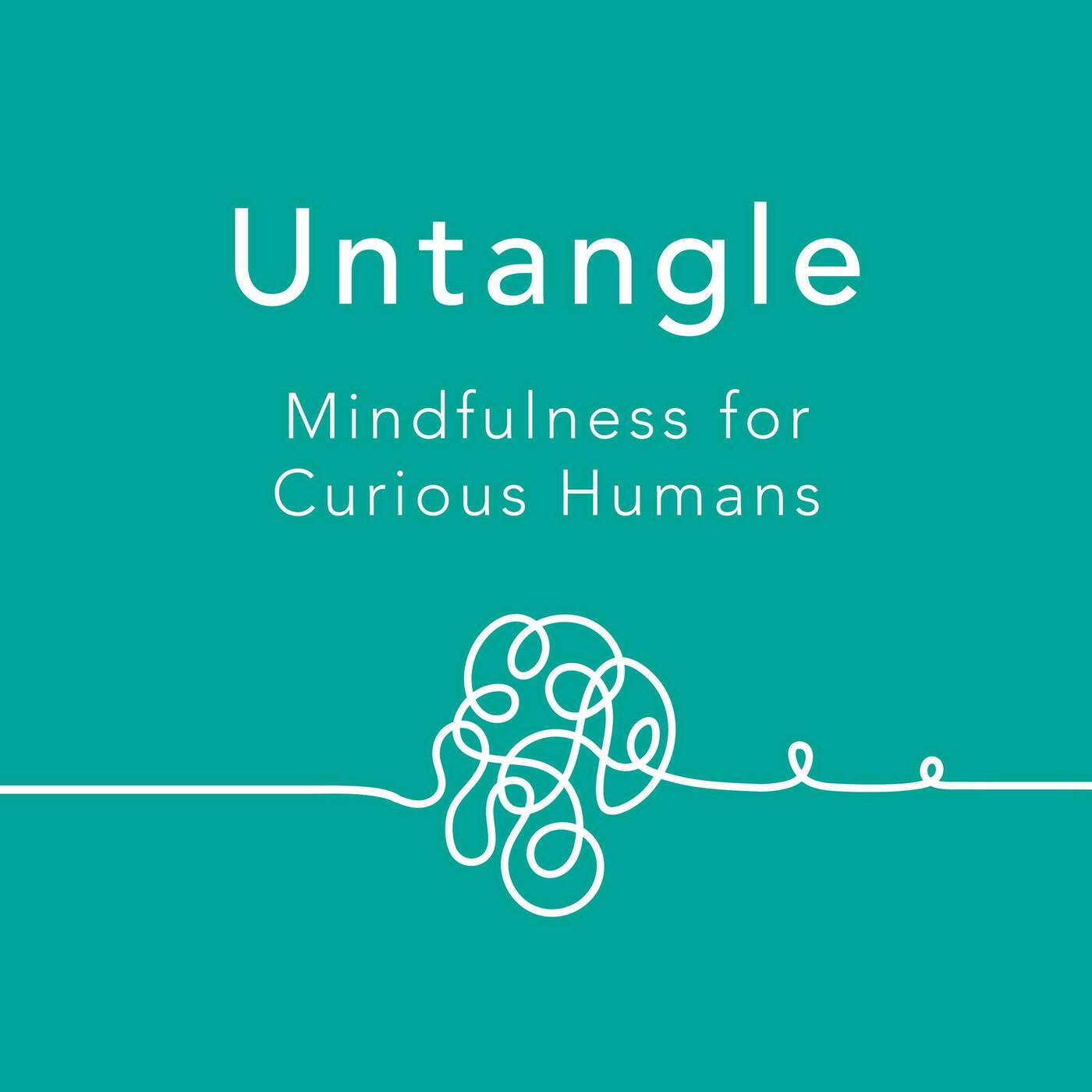
UntangleHow We Can Revitalize Everyday Life, Boost Happiness. With Tali Sharot.Todays guest is Tali Sharot, professor of Cognitive neuroscience at University College London (UCL) and MIT. She’s also the Director of the Affective Brain Lab at University College London, which integrates neuroscience, behavioral economics, and psychology to study the influence of emotion and motivation on beliefs and decisions. Her most recent book is called Look Again, The Power of Noticing What Was Already There.
In this conversation, Tali discusses her journey into neuroscience and psychology, exploring the intersection of these fields with behavioral economics. She delves into the concept of optimism, its effects on mental health and...
2025-06-0345 min
Bounce! Conversations with Larry WeeksWhy Joy Fades: Tali Sharot on The Power of Noticing What's Always TherePeople think happiness comes from getting everything you want. But the science shows, it's the absence, the novelty, and the change that bring joy back - Tali Sharot Ever wonder why lasting happiness can feel so elusive? This episode delves into the neuroscience of habituation, and why our brains, despite achieving desires, tend to filter out positive experiences. We'll explore this phenomenon and uncover practical strategies to consciously re-engage with what's already good in your life. My guest is Dr. Tali Sharot, a cognitive neuroscientist and professor at University College London, where she directs the A...
2025-04-151h 07
The Nick Standlea ShowDr. Tali Sharot: Are you bored, stuck, or just... not excited by life anymore?Why do we stop noticing the most meaningful parts of our lives?
In this episode of The Nick Standlea Show, neuroscientist and author Dr. Tali Sharot joins Nick to discuss her new book, Look Again: The Power of Noticing What Was Always There. They explore the science of habituation, the secret to revitalizing relationships, reigniting joy, and making everyday life feel vibrant again. From midlife malaise to marriage monotony, Tali explains how small changes—like disrupting routines or traveling differently—can help us rediscover wonder.
We also unpack:
* Why we become desensitized to even the...
2025-04-1455 min
The Steve Rover Momentum ShowClarity, Focus, Momentum: Actionable Strategies to Overcome OverthinkingClear Mind, Real Moves: How to Beat Mental Overload and Build MomentumIf your brain feels like a browser with 72 tabs open, this episode is for you.Overthinking, mental clutter, analysis paralysis—we all go through it. But if you want momentum, you need clarity.In this episode of The Steve Rover Momentum Show, we’re diving deep into how to simplify your mind, organize your priorities, and start executing with focus.Forget overcomplicated frameworks—this is about cutting through the noise and building real momentum with simple, high-impact habits.We b...
2025-04-0420 min
BookBytesLook Again by Tali SharotIn this episode of BookBytes, we explore Look Again: The Power of Noticing What Was Always There by Tali Sharot. This book examines how our brains filter reality, causing us to overlook what’s familiar and miss opportunities for creativity, happiness, and better decision-making.
Key Takeaways – Insights from the Book:
1. Habituation Dims the Spark
• Our brains tune out repetitive stimuli to conserve resources.
• This filtering applies to daily experiences, relationships, and even social issues.
• Breaking out of mental autopilot requires actively seeking novelty and paying attention to what we often overloo...
2025-03-2216 min
Depression Detox Show | Daily Inspirational Talks955 | Tali Sharot: "Alter Your Beliefs."Speaker: Tali Sharot (Neuroscientist and professor of cognitive neuroscience) Message: How to effectively change someone's mind. Source: Tali Sharot: Intelligent People Have Greater Difficulty Changing Their BeliefsConnect with Tali Sharot: Website: N/AInstagram: N/ABook: Look Again: The Power of Noticing What Was Always TherePrevious Episodes:885 | Tali Sharot:“What Makes Up A Good Life.”
2025-02-0713 min
Rise with RoxieDr. Tali Sharot: The Neuroscience of Happiness, Breaking & Creating Habits and the Power of VarietyDr. Tali Sharot, one of the most innovative neuroscientists of our time, joins us to explore the science of behaviour, happiness, and change. As the author of The Optimism Bias and The Influential Mind, Tali is an expert in how our brains shape our lives and decisions. In this episode, we dive into the fascinating concept of habituation—how our minds adapt to experiences over time, often dulling our joy and awareness. Tali reveals how dishabituation can bring variety, happiness, and meaning back into our lives, offering practical tools to help us wake up to the world aro...
2025-01-2054 min
The Decision Education PodcastEpisode 033: The Neuroscience of Optimism with Dr. Tali SharotCan optimism be both a strength and a weakness? Annie Duke welcomes cognitive neuroscientist Dr. Tali Sharot to explore her groundbreaking research on optimism bias, memory, decision-making, and human behavior. Tali shares how the brain processes information, the adaptive functions of optimism bias, and the impact of habituation on motivation.
Key takeaways from this episode include the intricate relationship between memory and forecasting, the challenges of updating our beliefs, and practical strategies to help mitigate the negative effects of cognitive biases.
This is The Decision Education Podcast, where we explore the science of decision-making with...
2025-01-0851 min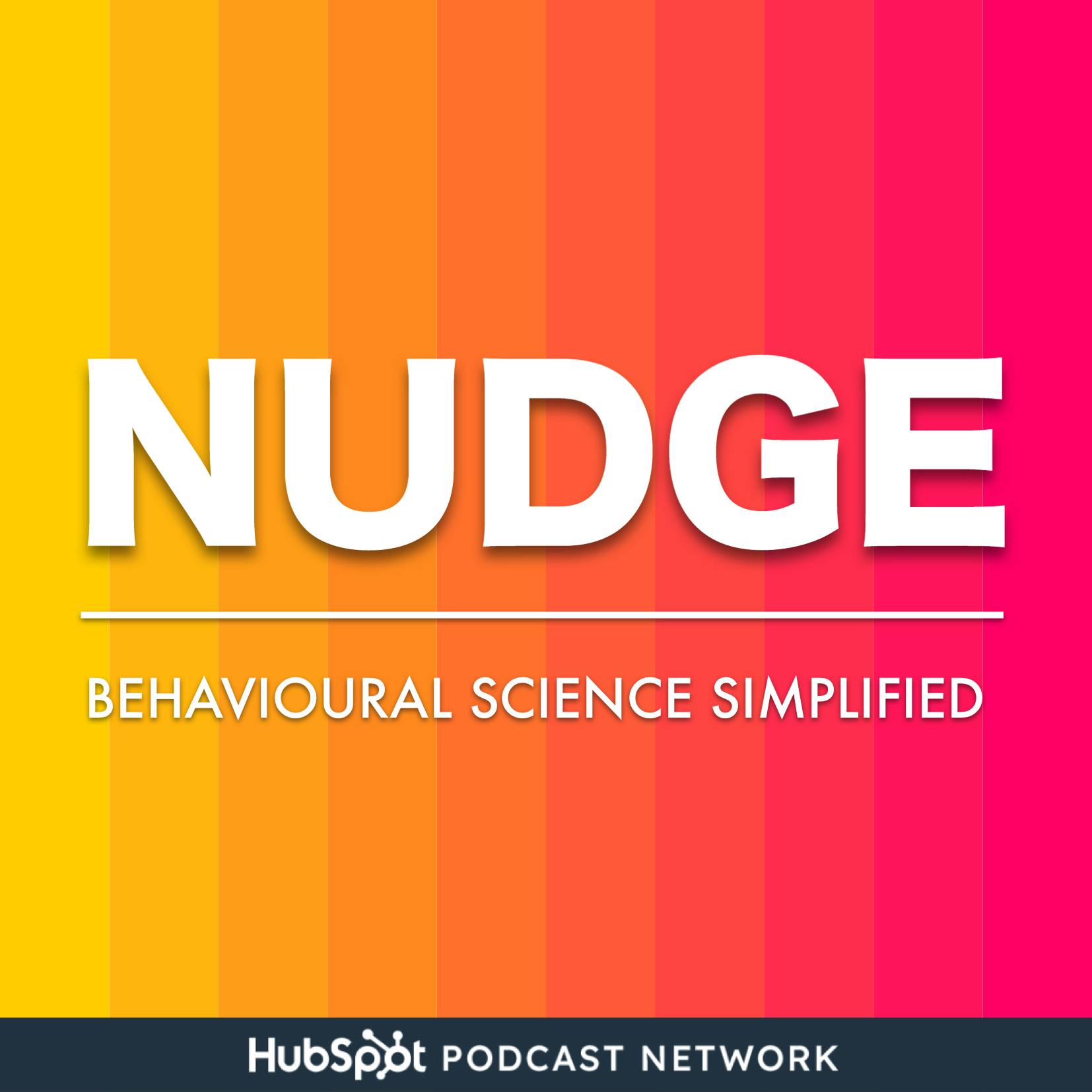
NudgeThe best of Nudge in 2024I spoke to the leading behavioural science authors, researchers and practitioners in 2024. Here are their top lessons. It features insights from Tali Sharot, Todd Rodgers, Rory Sutherland, Prof. Sarah Moore, and Chris Voss. Plus, some big news for 2025. You’ll learn: Why our happiness fades, no matter how good life gets (feat. Tali Sharot).How shorter emails can drastically improve response rates (feat. Todd Rogers).Why our behaviours often shape our attitudes—rather than the other way around (feat. Rory S...
2025-01-0637 min
Depression Detox Show | Daily Inspirational Talks885 | Tali Sharot:“What Makes Up A Good Life.”Neuroscientist and professor of cognitive neuroscience Tali Sharot is back to discuss the core tenets of living a good life. Source: Tali Sharot | Look Again: The Power of Noticing What Was Always There | Talks at GoogleConnect with Tali Sharot: Website: N/AInstagram: N/ABook: Look Again: The Power of Noticing What Was Always TherePrevious Episodes:Hosted by Malikee Josephs (Pronounced Muh...
2024-11-0115 min
Brain StoriesBrain Stories – Episode 20: Tali Sharot on what influences our beliefs and decision makingProfessor Tali Sharot talks to Caswell and Selina about why we're easy to influence and overly optimistic Date of episode recording: 2024-07-19T00:00:00Z Duration: 00:49:49 Language of episode: English TAGS: as before Presenter: Caswell Barry; Selina Wray Guests: Professor Tali Sharot Producer: Patrick Robinson
2024-09-0949 min
10% Happier with Dan HarrisModern Life Numbs You. Here's The Neuroscience Of Waking Up | Tali SharotNew episodes come out every Monday, Wednesday, and Friday for free, with 1-week early access for Wondery+ subscribers. --- It's so easy, especially these days, to numb out. To get bored. To move through life on autopilot. There is even a scientific term for this: habituation. Today we're talking to a researcher who co-authored a new book about the neuroscience of habit and how to wake up again. To make things exciting. Or as she says, to "re-sparkle". Tali Sharot is a professor of cognitive neuroscience at University College London and M...
2024-09-0949 min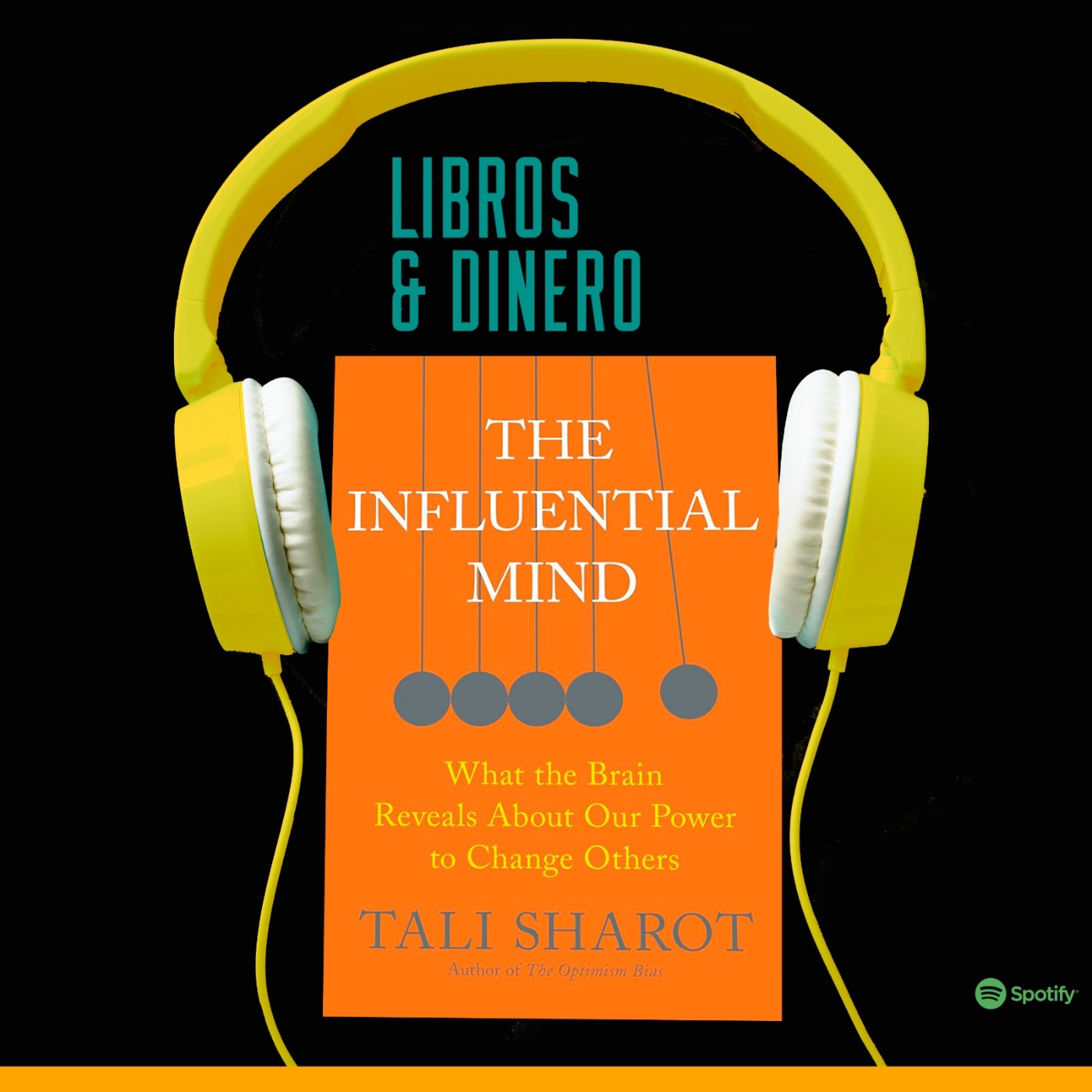
Libros y DineroResumen en español "The Influential Mind" de Tali SharotLograrás que te escuchen y que sea MUY placentero.
La información libera la misma dopamina que cuándo tenemos sexo o comemos un “pie” de manzana.
Neurociencias y buena psicología para INFLUIR.
Entendiendo tu cerebro podrás comunicar mejor e influir más.
Descubre más escuchando mi resumen del libro:
“THE INFLUENTIAL MIND” de Tali Sharot (Neurocientífica Cognitiva)
Si te gusta suscríbete y comparte ;)
2024-09-0726 min
The Mel Robbins PodcastHow To Make Your Life Exciting AgainNew research shows that your work, your life, and your relationships will get boring. Today, you’ll learn a simple tool you can use to make your life exciting, joyful, and energizing again. This profound conversation will allow you to truly understand and connect the dots between why you've become bored with what used to excite you – and how you can create more meaning in your life.In this episode, Mel is joined by the renowned neuroscientist from University College London and MIT, Dr. Tali Sharot. She is here to teach you the...
2024-07-1845 min
The Mel Robbins PodcastHow To Make Your Life Exciting AgainNew research shows that your work, your life, and your relationships will get boring. Today, you’ll learn a simple tool you can use to make your life exciting, joyful, and energizing again. This profound conversation will allow you to truly understand and connect the dots between why you've become bored with what used to excite you – and how you can create more meaning in your life.In this episode, Mel is joined by the renowned neuroscientist from University College London and MIT, Dr. Tali Sharot. She is here to teach you the...
2024-07-1845 min
unSILOed with Greg LaBlanc441. Breaking Free From Emotional Habituation with Tali SharotHumans are creatures of habit. It’s even wired that way in our brains. But what impact does habituation have on personal happiness?Tali Sharot is a professor of neuroscience at University College London and researches habituation, adaptation, and other cognitive biases. Her latest book, Look Again: The Power of Noticing What Was Always There co-authored with Cass Sunstein explores how habituation leads people to stop noticing both good and bad things they’re accustomed to and the benefits of breaking free from those habits. Tali and Greg discuss why people are more likely to feel...
2024-07-1759 min
Za dużo tego Wszystkiego3. O magicznym myśleniu. Z gościem. - Artur TelwikasW tym odcinku gościmy dra Artura Telwikasa i rozmawiamy o magicznym myśleniu.
Zastanawiamy się, czy irracjonalizm leży w naturze człowieka i co możemy na tym zyskać.
I garść uwag oraz literatury w temacie - od naszego gościa:
Richard Wiseman przeprowadził badania nad wiarą w przesądy i ich wpływem na ludzkie zachowanie i wykazał, że pomagają one ludziom czuć się pewniej w trudnych sytuacjach (efekt placebo).
Stuart Vyse napisał książkę "Believing in Magic", w której analizuje psychologiczne aspekty w kwestii przesądów i wykazuje ichpotencj...
2024-07-0853 min
MAKING SENSE mit Chris und Micha#66 - Warum wir mehr Erfahrungen als Produkte sammeln sollten und was der Illusory Truth Effect ist.In dieser Folge gibt Chris euch noch einmal mit auf den Weg, wieso Erfahrungen länger halten als Produkte, was es mit dem Illusory Truth Effect auf sich hat und Micha taucht ein in die Welt des "Nudging".
Bereit für eine volle Ladung? Enjoy, learn & feedback via ChrisUndMicha@gmail.com
Die detaillierteren Shownotes, für alle, die es genauer wissen wollen:
Der Unterschied zwischen Hirschen und Rehen von der NABU erklärt: Link
Dokumentation auf Arte über Snoop Dogg endet mit einer authentischen Lobeshymne auf sich selbst: Link
Der Medizinpodcast von Peter Attia: Link
...
2024-06-191h 06
NudgeHow to win any argument (according to a neuroscientist)I guarantee that the words you use to win arguments are ineffective. I don’t think you’re a lousy persuader, I think we all are. Today, world-leading neuroscientist Tali Sharot shares her decade-long research into persuasion. She tells me that the way I argue is ineffective and reveals how to win any argument. Access the bonus episode: https://nudge.ck.page/de30a8ac24Tali’s book, Look Again: https://tinyurl.com/5n8p3btbTali’s lab: https://affectivebrain.com/?page_id=161Sign up to my n...
2024-06-1722 min
The Mel Robbins PodcastHow to Motivate Yourself (and Others) to Change Any BehaviorDo you want to know the secret to unlocking motivation in yourself or someone you love? If you want to change any behavior for the better…Or if you’ve got someone in your life (don’t we all?!) who you wish would change… Today’s episode is for you. You’ll learn why guilt, pressure, fear, crying, threats, and ultimatums will not help anyone change, and there’s a scientific reason why. Then, you’ll learn the 3 very specific tactics that inspire anyone to quickly change their behavior for the better, incl...
2024-05-301h 00
The Mel Robbins PodcastHow to Motivate Yourself (and Others) to Change Any BehaviorDo you want to know the secret to unlocking motivation in yourself or someone you love? If you want to change any behavior for the better…Or if you’ve got someone in your life (don’t we all?!) who you wish would change… Today’s episode is for you. You’ll learn why guilt, pressure, fear, crying, threats, and ultimatums will not help anyone change, and there’s a scientific reason why. Then, you’ll learn the 3 very specific tactics that inspire anyone to quickly change their behavior for the better, incl...
2024-05-301h 00
Curious Minds at WorkCM 265: Tali Sharot on How to Rekindle HappinessWe all want to be happy. In fact, it’s our desire for happiness that drives most of our decisions, like our friendships, our activities, even our purchases.
Yet, over time, we find that the things that made us so happy at the start – that new car or delicious meal – end up losing their luster.
I was curious about why this happens and what, if anything, we can do about it. That’s why I wanted to talk to Tali Sharot, cognitive neuroscientist, professor at University College London and MIT, and director of the Affective Brain Lab. In her latest book, Lo...
2024-05-0649 min
Depression Detox Show | Daily Inspirational Talks750 | Tali Sharot: "What Makes People Happiest."Neuroscientist and professor of cognitive neuroscience Tali Sharot makes her first appearance on the show to teach us the most effective way to disrupt our normal daily routines and live happier and more fulfilling lives. Source: Tali Sharot | Look Again: The Power of Noticing What Was Always There | Talks at GoogleConnect with Tali Sharot: Website: N/AInstagram: N/ABook: Look Again: The Power of Noticing What Was Always There
2024-04-2614 min
Where We Go Next99: How to Reset and Retrain Our Brains, with Tali SharotDr. Tali Sharot is a professor of cognitive neuroscience at MIT and University College London, and the founder and director of the Affective Brain Lab, a cognitive neuroscience research laboratory dedicated to unraveling the mysteries of the human brain. She’s the author of The Optimism Bias: A Tour of the Irrationally Positive Brain, The Influential Mind: What the Brain Reveals About Our Power to Change Others. Her newest book, co-authored with Cass Sunstein is titled Look Again: The Power of Noticing What Was Always There.Look Again: The Power of Noticing What Was Always There...
2024-04-1654 min
Commonwealth Club of California PodcastTali Sharot and Cass Sunstein: The Power of Noticing What Was Already ThereNeuroscience professor Tali Sharot and Harvard law professor (and presidential advisor) Cass R. Sunstein have investigated why people stop noticing both the great and not-so-great things around them and how to “dishabituate” at the office, in the bedroom, at the store, on social media, and in the voting booth.Have you ever noticed that what is thrilling on Monday tends to become boring on Friday? Even exciting relationships, stimulating jobs, and breathtaking works of art can lose their sparkle after a while. Sharot and Sunstein say that many people stop noticing what is most wonderful in their own...
2024-03-241h 08
The Next Big IdeaLOOK AGAIN: How to See Your Life With Fresh EyesDo you ever feel like your life has become a film loop of the familiar? Maybe you sympathize with the elegiac poet Logan Roy, who said, "Nothing tastes like it used to, does it? Nothing's the same as it was." What lit you up on Monday barely sparks your interest by the weekend. But don't worry, there's nothing wrong with you. You're just experiencing what scientists call habituation, a fancy word for a phenomenon we all face. And the good news is that there's something you can do about it, methods and tools you can use to disrupt familiar...
2024-03-2151 min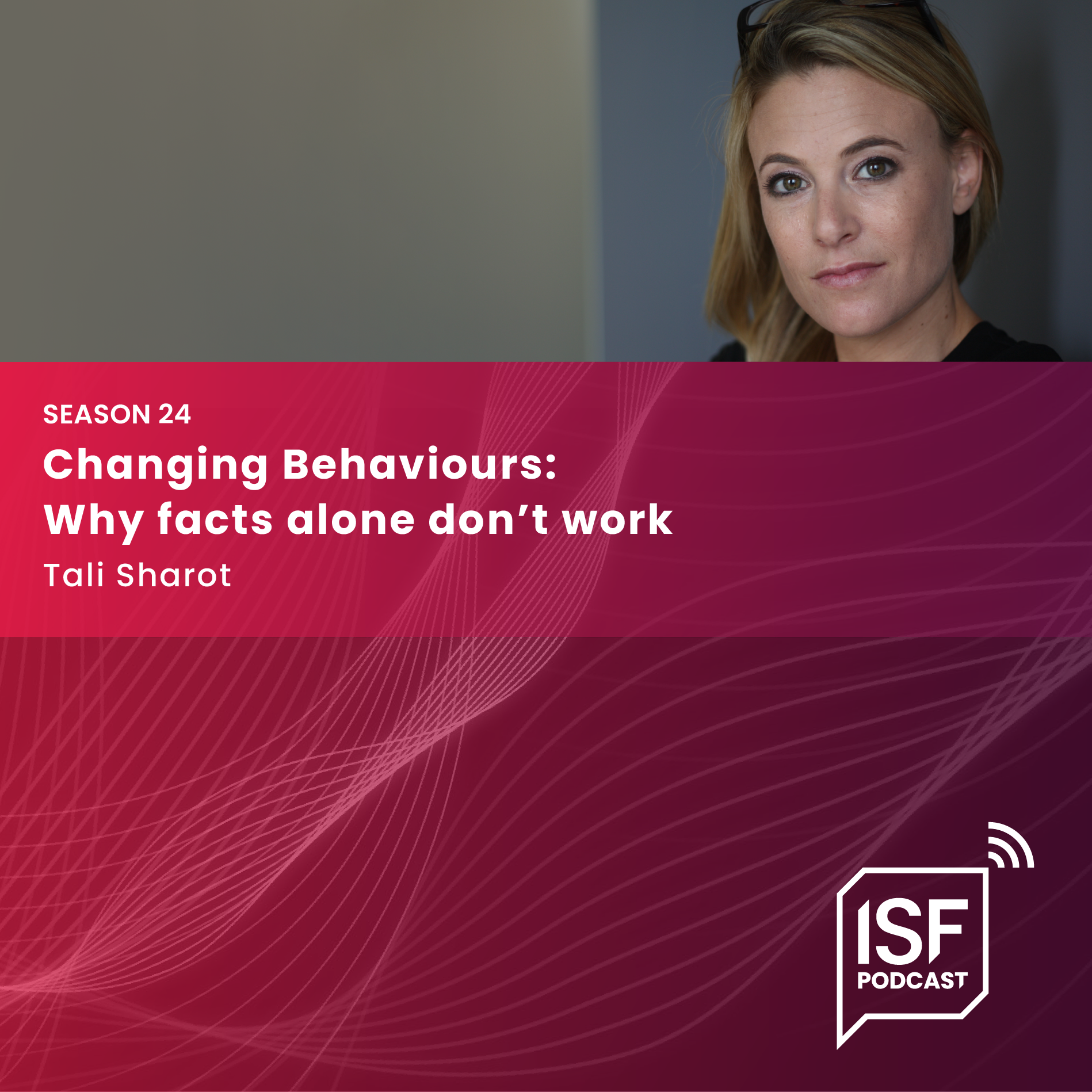
ISF PodcastTali Sharot - Changing Behaviours: Why facts alone don't workToday’s episode was recorded at ISF’s 2023 Congress in Rotterdam. Steve sat down with Tali Sharot, professor of neuroscience at University College London, to talk about her fascinating research on optimism bias. Tali offers fresh, evidence-based ideas on effective communication for security leaders seeking to present their message to their board and raise cyber awareness within the organisation.
Key Takeaways:
1. Innately, the brain is an optimist.
2. Implications for the business community.
3. Present bias means that people care more about now than the future.
4. Data is key, and pairing anecdotes with data can be more...
2024-03-1920 min
How To Academy PodcastNeuroscientist Tali Sharot - How to See the World AnewWe get used to dirty air, people grow to accept authoritarianism, take foolish risks, and we are more liable to believe misinformation than ever before.Too much of a good thing might be bad news after all. Rituals and habituation cause acclimatization and indifference. So how do we keep life interesting? Exciting events, relationships, stimulating jobs and breathtaking works of art lose their sparkle after time. People stop noticing what is wonderful and they also stop noticing what is terrible. With examples of her research, Professor Tali Sharot shares tips for how to keep life s...
2024-03-151h 04
Choiceology with Katy MilkmanRepeat After Me: With Guests Jennifer LeMesurier & Tali SharotVitamin C is a cure for the common cold. Bats are blind. Sugar makes children hyperactive.All of these statements are false. So why are they so pervasive? And why do they feel so true?In this episode of Choiceology with Katy Milkman, we look at a phenomenon that can cause us to believe inaccurate information more than we should, and also lead us to trust reliable information less than we should.If you’re over a certain age, you might remember friends or family panicking about MSG, or monosodium glutamate, particularly in Ame...
2024-03-1134 min
Farrel Buchinsky's Listen LaterLook Again: The Power of Noticing What Was Always There Podcast: New Books in Psychology (LS 37 · TOP 2.5% what is this?)Episode: Look Again: The Power of Noticing What Was Always TherePub date: 2024-02-22Get Podcast Transcript →powered by Listen411 - fast audio-to-text and summarizationToday’s book is: Look Again: The Power of Noticing What Was Always There (Atria/One Signal Publishers, 2024), by Tali Sharot and Cass R. Sunstein, a book that asks why stimulating jobs and breathtaking works of art lose their sparkle after a while. People stop noticing what is most wonderful in their own lives. They al...
2024-03-0352 min
The Diary Of A CEO with Steven BartlettMoment 151: Neuroscientist Reveals The 3 Things You Need To Do For A Fulfilling Life: Tali SharotIn this moment, neuroscientist, Professor Tali Sharot, discusses why happiness is not the most important thing in life, and actually it is just 1 of 3 critical factors for a complete life. Most people think that the meaning of life for humans is to try and find the maximum amount of happiness, however this just factor one. Tali says that the second factor is meaning. Often in your life you do a task not because it will give you happiness but because it gives you a sense of completeness that comes from meaning. Finally, Tali says that we need what is...
2024-03-0114 min
Behavioral Science For Brands: Leveraging behavioral science in brand marketing.Interview: Tali Sharot, author of The Optimism Bias, on how to create positive consumer expectationsIn this episode, we sit down with Tali Sharot, a neuroscience professor at University College London and M.I.T., to talk about the practical application of cognitive neuroscience.
2024-02-2941 min
Ignite The Full Audiobook That Keeps Book-Lovers Hooked.Look Again by Tali Sharot, Cass R. SunsteinPlease visithttps://thebookvoice.com/podcasts/2/audible/41469to listen full audiobooks.
Title: Look Again
Author: Tali Sharot, Cass R. Sunstein
Narrator: Byron Wagner, Imani Jade Powers
Format: mp3
Length: 6 hrs and 30 mins
Release date: 02-29-24
Ratings: 4 out of 5 stars, 5 ratings
Genres: Economics
Publisher's Summary:
Have you ever noticed that what is thrilling on Monday tends to become boring on Friday? Even exciting relationships, stimulating jobs, and breathtaking works of art lose their sparkle after a while. People stop noticing what is most wonderful in their own lives. They also stop noticing what is terrible. They stay in abusive relationships. People...
2024-02-296h 30
The Michael Shermer ShowThe Power of Noticing What Was Always ThereHave you ever noticed that what is thrilling on Monday tends to become boring on Friday? Even exciting relationships, stimulating jobs, and breathtaking works of art lose their sparkle after a while. People stop noticing what is most wonderful in their own lives. They also stop noticing what is terrible. They get used to dirty air. They stay in abusive relationships. People grow to accept authoritarianism and take foolish risks. They become unconcerned by their own misconduct, blind to inequality, and are more liable to believe misinformation than ever before. But what if we could find a...
2024-02-271h 34
Embark On The Sensational Full Audiobook Now, Curious Minds!Look Again by Tali Sharot, Cass R. SunsteinPlease visithttps://thebookvoice.com/podcasts/2/audible/41244to listen full audiobooks.
Title: Look Again
Author: Tali Sharot, Cass R. Sunstein
Narrator: Imani Jade Powers, Byron Wagner
Format: mp3
Length: 6 hrs and 30 mins
Release date: 02-27-24
Ratings: 4.5 out of 5 stars, 69 ratings
Genres: Economics
Publisher's Summary:
Have you ever noticed that what is exciting on Monday tends to become boring on Friday? Even passionate relationships, stimulating jobs, and breathtaking works of art lose their sparkle after a while. As easy as it is to stop noticing what is most wonderful in our lives, it’s also possible to stop noticing what is te...
2024-02-276h 30
New Books in PsychologyLook Again: The Power of Noticing What Was Always ThereToday’s book is: Look Again: The Power of Noticing What Was Always There (Atria/One Signal Publishers, 2024), by Tali Sharot and Cass R. Sunstein, a book that asks why stimulating jobs and breathtaking works of art lose their sparkle after a while. People stop noticing what is most wonderful in their own lives. They also stop noticing what is terrible, due to something called habituation. Because of habituation, people get used to dirty air, become unconcerned by their own misconduct, and become more liable to believe misinformation. But what if you could dishabituate? Could you find a way to s...
2024-02-2252 min
New Books in Public PolicyLook Again: The Power of Noticing What Was Always ThereToday’s book is: Look Again: The Power of Noticing What Was Always There (Atria/One Signal Publishers, 2024), by Tali Sharot and Cass R. Sunstein, a book that asks why stimulating jobs and breathtaking works of art lose their sparkle after a while. People stop noticing what is most wonderful in their own lives. They also stop noticing what is terrible, due to something called habituation. Because of habituation, people get used to dirty air, become unconcerned by their own misconduct, and become more liable to believe misinformation. But what if you could dishabituate? Could you find a way to s...
2024-02-2252 min
New Books in EconomicsLook Again: The Power of Noticing What Was Always ThereToday’s book is: Look Again: The Power of Noticing What Was Always There (Atria/One Signal Publishers, 2024), by Tali Sharot and Cass R. Sunstein, a book that asks why stimulating jobs and breathtaking works of art lose their sparkle after a while. People stop noticing what is most wonderful in their own lives. They also stop noticing what is terrible, due to something called habituation. Because of habituation, people get used to dirty air, become unconcerned by their own misconduct, and become more liable to believe misinformation. But what if you could dishabituate? Could you find a way to s...
2024-02-2252 min
New Books in Big IdeasLook Again: The Power of Noticing What Was Always ThereToday’s book is: Look Again: The Power of Noticing What Was Always There (Atria/One Signal Publishers, 2024), by Tali Sharot and Cass R. Sunstein, a book that asks why stimulating jobs and breathtaking works of art lose their sparkle after a while. People stop noticing what is most wonderful in their own lives. They also stop noticing what is terrible, due to something called habituation. Because of habituation, people get used to dirty air, become unconcerned by their own misconduct, and become more liable to believe misinformation. But what if you could dishabituate? Could you find a way to s...
2024-02-2248 min
The Academic LifeLook Again: The Power of Noticing What Was Always ThereToday’s book is: Look Again: The Power of Noticing What Was Always There (Atria/One Signal Publishers, 2024), by Tali Sharot and Cass R. Sunstein, a book that asks why stimulating jobs and breathtaking works of art lose their sparkle after a while. People stop noticing what is most wonderful in their own lives. They also stop noticing what is terrible, due to something called habituation. Because of habituation, people get used to dirty air, become unconcerned by their own misconduct, and become more liable to believe misinformation. But what if you could dishabituate? Could you find a way to s...
2024-02-2252 min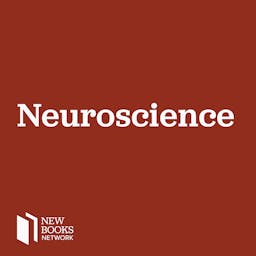
New Books in NeuroscienceLook Again: The Power of Noticing What Was Always ThereToday’s book is: Look Again: The Power of Noticing What Was Always There (Atria/One Signal Publishers, 2024), by Tali Sharot and Cass R. Sunstein, a book that asks why stimulating jobs and breathtaking works of art lose their sparkle after a while. People stop noticing what is most wonderful in their own lives. They also stop noticing what is terrible, due to something called habituation. Because of habituation, people get used to dirty air, become unconcerned by their own misconduct, and become more liable to believe misinformation. But what if you could dishabituate? Could you find a way to s...
2024-02-2252 min
Becoming Your Best | The Principles of Highly Successful LeadersEpisode 415 - Look Again: The Power of Noticing What Was Always There with Tali SharotHave you noticed we overcome trauma at the same pace we get used to waking up to a breathtaking view? Our brain is an adaptation machine working tirelessly to keep us alive, yet that tendency to habituate to everything might also diminish our happiness. In this episode, Professor Tali Sharot joins us to reflect on habituation and its impact on daily happiness. Tali Sharot is a Professor of Cognitive Neuroscience in the Department of Experimental Psychology and The Max Planck UCL Centre for Computational Psychiatry at University College London and on the faculty of the D...
2024-01-3032 min
The Adversity Advantage with Doug BopstNeuroscientist Reveals The Shocking Truth About Optimism, Manifestation, Motivation & Goal Setting | Dr. Tali SharotDr. Tali Sharot is the director of the Affective Brain Lab. She is a Professor of Cognitive Neuroscience at University College London and on the faculty of the Department of Brain and Cognitive Sciences at MIT. Sharot holds a BA in Economics and Psychology from Tel Aviv University and a PhD from New York University. Sharot’s research integrates neuroscience behavioral economics and psychology to study how emotion and motivation influences people’s beliefs and decisions. Prof. Sharot’s award winning books – The Optimism Bias (2011) and The Influential Mind (2017) – have been praised by outlets including the NYT, Times, Forbes and more...
2024-01-2557 min
The Diary Of A CEO with Steven BartlettNo.1 Neuroscientist: NEW Research Explains Why Life, Work & Your Sex Life will eventually get Boring! (HOW TO STOP THIS HAPPENING) Dr. Tali SharotIs new always better? Instead of always chasing the newest thing, is there not a way that you can appreciate the people and possessions already in your life?In this new episode Steven sits down again with leading neuroscientist, Dr. Tali Sharot.Dr. Tali Sharot is the director of the Affective Brain Lab and Professor of Cognitive Neuroscience at University College London. Sharot’s research combines neuroscience with the study of behaviour and psychology to examine how emotions and motivation lead to people’s beliefs and decisions. She is the author of the award-winning books, ‘The Op...
2023-11-161h 30
the Bestsellers SummaryThe Righteous Mind: Understanding the Foundations of Moral PsychologyChapter 1:what is The Righteous Mind about
"The Righteous Mind: Why Good People are Divided by Politics and Religion" is a book written by social psychologist Jonathan Haidt. In this book, Haidt explores the nature of morality and the psychological foundations that drive our moral judgments.
Haidt proposes that human beings have multiple moral intuitions, which are shaped by evolution and socialization. He argues that these intuitions often lead to divergent moral frameworks, influencing our political and religious beliefs. Haidt presents his theory of moral foundations, which include care/harm, fairness/cheating, loyalty...
2023-11-1412 min
Young and Profiting with Hala Taha (Entrepreneurship, Sales, Marketing)Tali Sharot: The Neuroscience of Positivity, How Our Brains Create Our Future | Human Behavior E236While working on her Ph.D. on traumatic memory in New York, Dr. Tali Sharot witnessed the 9/11 attacks on the Twin Towers. She set out to investigate people's memories of the terrorist attacks and discovered that although people felt their memories were as accurate as a videotape, they were often filled with errors. She decided then to focus her research on how emotion affects people’s memories and decisions. In today’s episode, Tali tells us about the ways we are hardwired to be optimists and what determines how, and if, we are able to influence others. ...
2023-07-3158 min
Growth Minds with Sean KimNo.1 Neuroscientist Reveals Science-Backed Secrets to Persuade Anyone (Even Yourself!)Dr. Tali Sharot is recognized as "one of the top female scientists in her country," and listed as one of the 15 exemplary female Israeli-born scientists alive. She's currently a Professor of Cognitive Neuroscience at MIT, author of The Optimism Bias, The Influential Mind, and her latest book, Look Again: The Power of Noticing What Was Always There.
In our conversation, Sean and Dr. Sharot discussed:
What being an optimist is defined as?
Is it better to be an optimist or pessimist in life, and in which situations are there benefits of being one...
2023-07-1958 min
The Alizee Yeezy ShowBecoming An Optimist With Dr. Tali Sharot!Today I'm joined by neuroscientist Dr Tali Sharot to discuss biases, cognitive behavioural changes, the effect of misinformation on the brain, negativity, and motivating yourself by rewarding positive behaviour. Tali Sharot is a professor of cognitive neuroscience at MIT, and author of books such as 'The Optimism Bias' and 'The Influential Mind'.Tali's books: https://www.amazon.co.uk/Tali-Sharot/e/B004ANWOX4?ref=sr_ntt_srch_lnk_2&qid=1673187848&sr=1-2FOLLOW MY NEW INSTA: https://www.instagram.com/bigalizeeyeezy/Subscribe for weekly podcasts and highlights!Merchandise here: ayclothing.teemill.com
2023-07-091h 06
21 MinutiTali Sharot - La scienza dell'ottimismo21 Minuti History - edizione 2011 - Tali Sharot, docente di neuroscienze cognitive all’University College London e al MIT, illustra come abitualmente il cervello tenda a immaginare scenari positivi per il futuro, attivando soprattutto una parte del lobo frontale.
2023-04-2119 min
Религия и Общество - Religiolog076 Как говорить с тем кто думает иначе, убедить оппонента. Факты vs Эмоции. Тали Шарот о предубежденияхТали Шарот, профессор когнитивной нейробиологии в Университетском колледже Лондона, рассказывает о силе предубеждений и о том, почему факты не побеждают в битве против эмоций. Она делится несколькими исследованиями, которые показывают что научные данные не всегда помогают нам преодолеть предвзятость (Confirmation Bias). Затем, на примере вакцинации, она показывает что может помочь убедить того кто с вами не согласен. Tali Sharot is a Professor of cognitive neuroscience in the Department of Experimental Psychology at University College London. Источник - Big Think: Facts Don't Win Fights: Here’s How to Cut Through Confirmation Bias | Tali Sharot | Big Think • Facts Don't Win Fights: Here’s How to...
2023-03-1705 min
The Diary Of A CEO with Steven BartlettMoment 100 - A Neuroscientist Explains The Surprising Way To Be Happy TODAY!: Tali SharotWhat is the optimism bias? This is overestimating the good things that will happen in your future, despite all the evidence that may go against it. This is a systematic mistake that we all make as we always expect the future to be better than it ends up being and we underestimate the negatives that could happen. However, in this moment Dr. Tali Sharot discusses how the optimism bias can be a positive as our expectations of future happiness affect our happiness right now, it can motivate you to try harder to make this a reality. As Dr. Sharot...
2023-03-1011 min
The Diary Of A CEO with Steven BartlettNo.1 Neuroscientist: Age 30 to 50 Will Be Your Unhappiest, Here's How To FIX IT! - Dr. Tali SharotIs the cup of life half full or half empty? Would you call yourself an optimist or a pessimist? What if you weren’t actually in control of this, but instead through the process of evolution your brain had been hardwired to be optimistic?Neuroscientist Dr. Tali Sharot calls this the ‘Optimism Bias’, it’s the belief that the future will be better, much better, than what has come before or even your current situation. This trick of the brain can effect how you remember the past and how you predict and plan for the future.In thi...
2023-01-091h 36
Plucking Up with Liz BohannonTali Sharot on How Motivations Can Change Our BehaviorTali Sharot is a Professor of Cognitive Neuroscience in the department of Experimental Psychology at University College London and best-selling author of The Optimism Bias and The Influential Mind. Her research integrates neuroscience, behavioral economics and psychology to study how emotion and motivation influences people’s beliefs, decisions and social interactions.Tali and I had a fascinating conversation about why we do the things we do, what can help us change, what works and what doesn’t. She’s breaking down the science for us–I learned a lot, and you will too.Learn mor...
2022-11-1559 min
Plucking Up with Liz BohannonTali Sharot on How Motivations Can Change Our BehaviorTali Sharot is a Professor of Cognitive Neuroscience in the department of Experimental Psychology at University College London and best-selling author of The Optimism Bias and The Influential Mind. Her research integrates neuroscience, behavioral economics and psychology to study how emotion and motivation influences people’s beliefs, decisions and social interactions.Tali and I had a fascinating conversation about why we do the things we do, what can help us change, what works and what doesn’t. She’s breaking down the science for us–I learned a lot, and you will too.Learn mor...
2022-11-1559 min
merak. listesi90- Yakınlaşma ve Kaçınma İlkesiGünlük hayatımızın her alanında yaklaşma ve kaçınma ilkesi ile birlikteyiz. Hiç tanımadığımız bir ortama girdiğimizde bize benzeyen ya da bizim gibi bir durumda görünen birisini aramamız da bu yüzden olabilir mi?
Zihnimiz haz yolunda gitmek üzere mi programlı? Yoksa tam tersi yönü izleyebilir mi? Hershberger’in merakı gibi acaba ateşten kaçınmanın ancak aleve yaklaşmakla mümkün olduğu durumlarda nasıl davranırız?
(0:00) Desteğiniz için teşekkürler
(1:15) Yakınlaşma ve Kaçınma ilkesine giriş
(2:00) Elimin ulaşacağı yerlerdeki abur...
2021-09-2211 min
Politics on the CouchOptimism - how we're drawn to the bright side, even in a pandemicRafael Behr talks to neuroscientist and author Tali Sharot about the optimism hard-wired into our thought processes, how it affects the way we look at the world – and what it means for politics. The conversation also covers the relationship between emotion and reason, how we should respect some of the more primitive parts of our brains, what messages work best to encourage people to act on climate change, and what connects sourdough and the hunt for a coronavirus vaccine.Tali Sharot is a professor at the Department of Experimental Psychology, University College London, where she is...
2021-02-2359 min
Way of the Emotional WarriorMicro or Macro Optimistwww.kaiehnes.com
Ep36 Micro or Macro Optimist
Hello and Welcome to the Way of the Emotional Warrior Podcast. My name is Kai Ehnes and today we will be answering the question of: Are you a Micro or Macro Optimist?
Lets start with what is an optimist?
An optimist is someone who has a hopeful outlook and typically expects good outcomes. For example: in the US, 42 to 45% of first marriages end in divorce and 60% of second marriages divorce. So, roughly ½ of marriages end in divorce. Yet: and here comes the kicker…Newlyweds believe that their marriage will survive. So, whe...
2021-02-0308 min
LSE IQ | Intelligent questions with social science answersShould we be optimistic?To subscribe on Apple podcasts please visit apple.co/2r40QPA or on Andriod subscribeonandroid.com/www.lse.ac.uk…unesStore.xml or search for 'LSE IQ' in your favourite podcast app or visit lse.ac.uk/iq
Welcome to LSE's award-winning podcast, LSE IQ, where we ask leading social scientists - and other experts - to answer an intelligent question about economics, politics or society.
Despite our growing collective pessimism about the state of the world, when it comes to our own lives, research suggests we are generally optimistic.
After a year that will remain synonymous with anxiety, isolation, en...
2021-02-0239 min
LSE PodcastsShould we be optimistic?To subscribe on Apple podcasts please visit apple.co/2r40QPA or on Andriod subscribeonandroid.com/www.lse.ac.uk…unesStore.xml or search for 'LSE IQ' in your favourite podcast app or visit lse.ac.uk/iq
Welcome to LSE's award-winning podcast, LSE IQ, where we ask leading social scientists - and other experts - to answer an intelligent question about economics, politics or society.
Despite our growing collective pessimism about the state of the world, when it comes to our own lives, research suggests we are generally optimistic.
After a year that will remain synonymous with anxiety, isolation, en...
2021-02-0239 min
LSE IQShould we be optimistic?Contributor(s): Dr Tali Sharot, Dr Joan Costa-Font, Professor David de Meza, Dr Chris Kutarna |
Despite our growing collective pessimism about the state of the world, when it comes to our own lives, research suggests we are generally optimistic.
After a year that will remain synonymous with anxiety, isolation, endless devastating news reports, and for too many – loss, this episode of LSE IQ asks: is optimism is good for us? And, beyond the effects on our wellbeing, is optimism an accurate lens through which to view the world?
Addressing these issues are: Dr Tali Sharot, Professor of Cognitive Neuroscience at UCL...
2021-02-0239 min
LSE IQ podcastShould we be optimistic?Contributor(s): Dr Tali Sharot, Dr Joan Costa-Font, Professor David de Meza, Dr Chris Kutarna |
Despite our growing collective pessimism about the state of the world, when it comes to our own lives, research suggests we are generally optimistic.
After a year that will remain synonymous with anxiety, isolation, endless devastating news reports, and for too many – loss, this episode of LSE IQ asks: is optimism is good for us? And, beyond the effects on our wellbeing, is optimism an accurate lens through which to view the world?
Addressing these issues are: Dr Tali Sharot, Professor of Cognitive Neuroscience at UCL...
2021-02-0239 min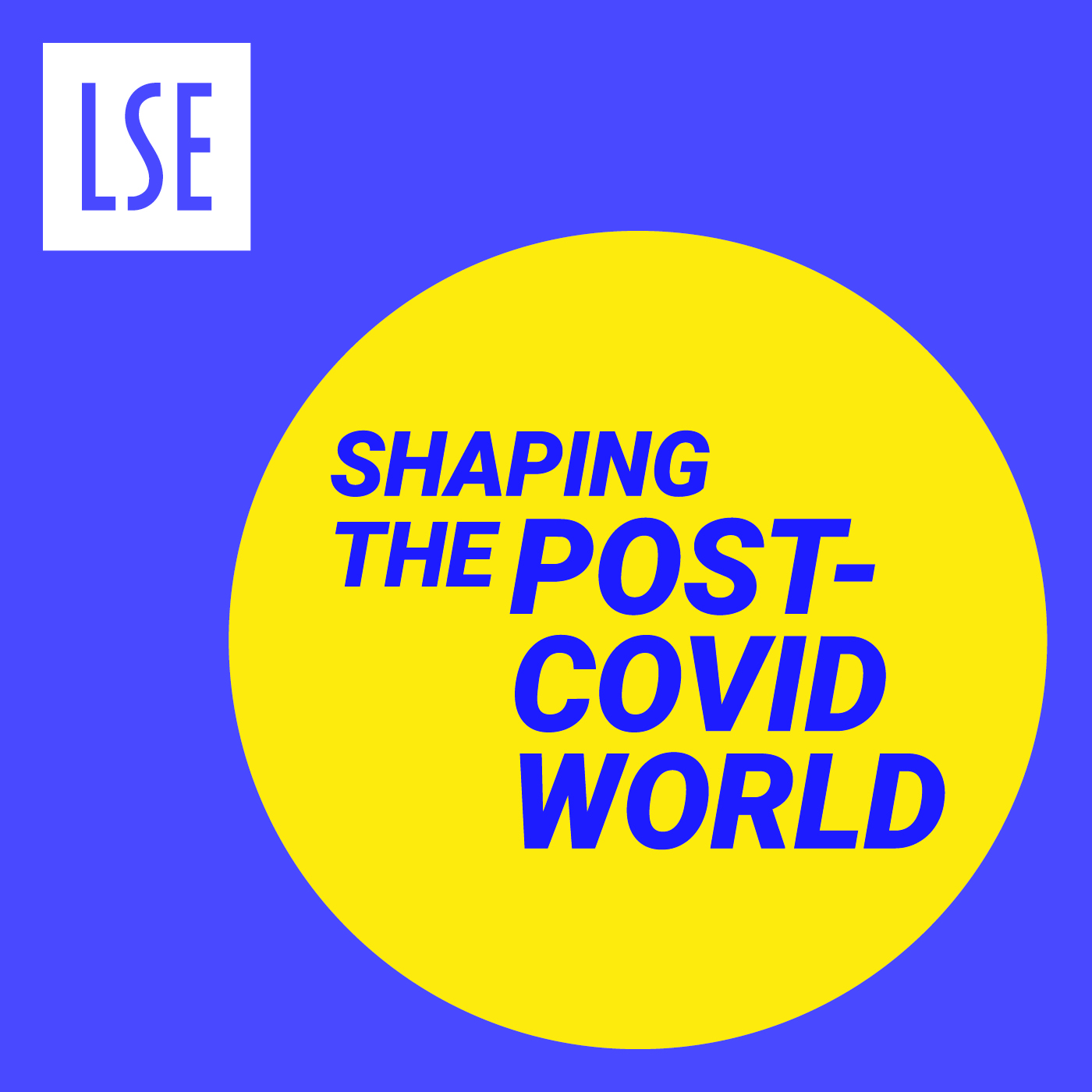
Shaping the Post-COVID WorldSHORTCAST | Behavioural Science and a Post-COVID WorldContributor(s): Professor Nick Chater, Professor Paul Dolan, Dr Grace Lordan, Professor Tali Sharot, Rory Sutherland | The impacts of COVID-19 on society post-COVID and how we deal with them hinge on how politicians, firms and the public respond. What valuable lessons can we learn from behavioural science in a post-COVID-19 world? These unique insights are crucial to mitigating the societal impacts of COVID-19.
Nick Chater (@NickJChater) is Professor of Behavioural Science, Warwick Business School. He is co-founder of Decision Technology Ltd, and is a member of the UK's Committee on Climate Change.
Paul Dolan (@profpauldolan) is Professor of Behavioural Science...
2021-01-2823 min
Being Well with Forrest Hanson and Dr. Rick HansonOptimism and Influence with Dr. Tali SharotWhat allows people to push on even during the darkest times? And how can we use that answer to influence our behavior, or the behavior of other people? Today Rick and Forrest are joined by Dr. Tali Sharot to explore the optimism bias, how optimism can exist alongside negativity, and how we can influence others more effectively. About our Guest: Dr. Sharot is a Professor of Cognitive Neuroscience at University College London, and the director of the Affective Brain Lab. She’s also the author of a number of wonderful books, including The Optimism Bias: A Tour of th...
2021-01-0450 min
PODCAST TRÊS LIÇÕESPODCAST 3L #5 - A MENTE INFLUENTE ( TALI SHAROT )Tali Sharot é professora de neurociência cognitiva no departamento de psicologia experimental da Universidade de Londres. Especialista também em neuropsicologia. Entenda como as emoções influenciam seu processo de tomada de decisões, e como você pode usar isso a seu favor em diversas situações. Faz sentido pra você esse conteúdo? Curta e Compartilhe!
2020-11-2814 min
101 Konsept Sesli KitapBaşkalarının Aklı - Tali Sharot | Sesli Kitap ÖzetiBaşkalarının Aklı - Tali Sharot (Kitap Özeti)
Seslendiren: Rıza Yıldırım
Seslendirdiğim kitabın özeti için www.ozetkitap.com 'a çok teşekkür ederim.
Diğer Sesli Kitaplardan haberdar olmak için lütfen kanalıma ücretsiz abone olun: https://bit.ly/2E9OqgQ
Patreon ile destek için: https://www.patreon.com/101KONSEPT
---
Support this podcast: https://podcasters.spotify.com/pod/show/101konsept/support
2020-11-151h 06
Shaping the Post-COVID WorldBehavioural Science and a Post-COVID WorldContributor(s): Professor Nick Chater, Professor Paul Dolan, Dr Grace Lordan, Professor Tali Sharot, Rory Sutherland | The impacts of COVID-19 on society post-COVID and how we deal with them hinge on how politicians, firms and the public respond. What valuable lessons can we learn from behavioural science in a post-COVID-19 world? These unique insights are crucial to mitigating the societal impacts of COVID-19.
Nick Chater (@NickJChater) is Professor of Behavioural Science, Warwick Business School. He is co-founder of Decision Technology Ltd, and is a member of the UK's Committee on Climate Change.
Paul Dolan (@profpauldolan) is Professor of Behavioural Science...
2020-11-041h 22
Product Book Club"The Influential Mind" book discussion with author Tali Sharot - September 2020This month we met to discuss the book "The Influential Mind: What the Brain Reveals About Our Power to Change Others" with the author Tali Sharot.
On this episode, we discuss about nudging, persuasion, behavioural rules, psychological theories and many more topics that influence us when making decisions.
Join productbookclub.com to know what other books we are reading, and participate in the upcoming discussions!
2020-09-2459 min
BBVA Aprendemos JuntosTali Sharot: ''The optimistic bias''Tali Sharot is the director of the Affective Brain Lab. She is a professor of cognitive neuroscience in the Experimental Psychology department at University College London and a senior research fellow at the Wellcome Trust.
Professor Sharot received her bachelor’s degree in economy and psychology from the University of Tel Aviv and her doctorate from New York University. She has received grants from the British Academy and the Forum for European Philosophy. Sharot’s research combines psychology and neuroscience behavioral economics with the aim of studying how emotion influences beliefs, decisions, and social interactions.
2020-06-2318 min
BBVA Aprendemos juntosTali Sharot: ''The optimism bias''Tali Sharot is the director of the Affective Brain Lab. She is a professor of cognitive neuroscience in the Experimental Psychology department at University College London and a senior research fellow at the Wellcome Trust. Professor Sharot received her bachelor's degree in economy and psychology from the University of Tel Aviv and her doctorate from New York University. She has received grants from the British Academy and the Forum for European Philosophy. Sharot's research combines psychology and neuroscience behavioral economics with the aim of studying how emotion influences beliefs, decisions, and social interactions.
2020-06-2318 min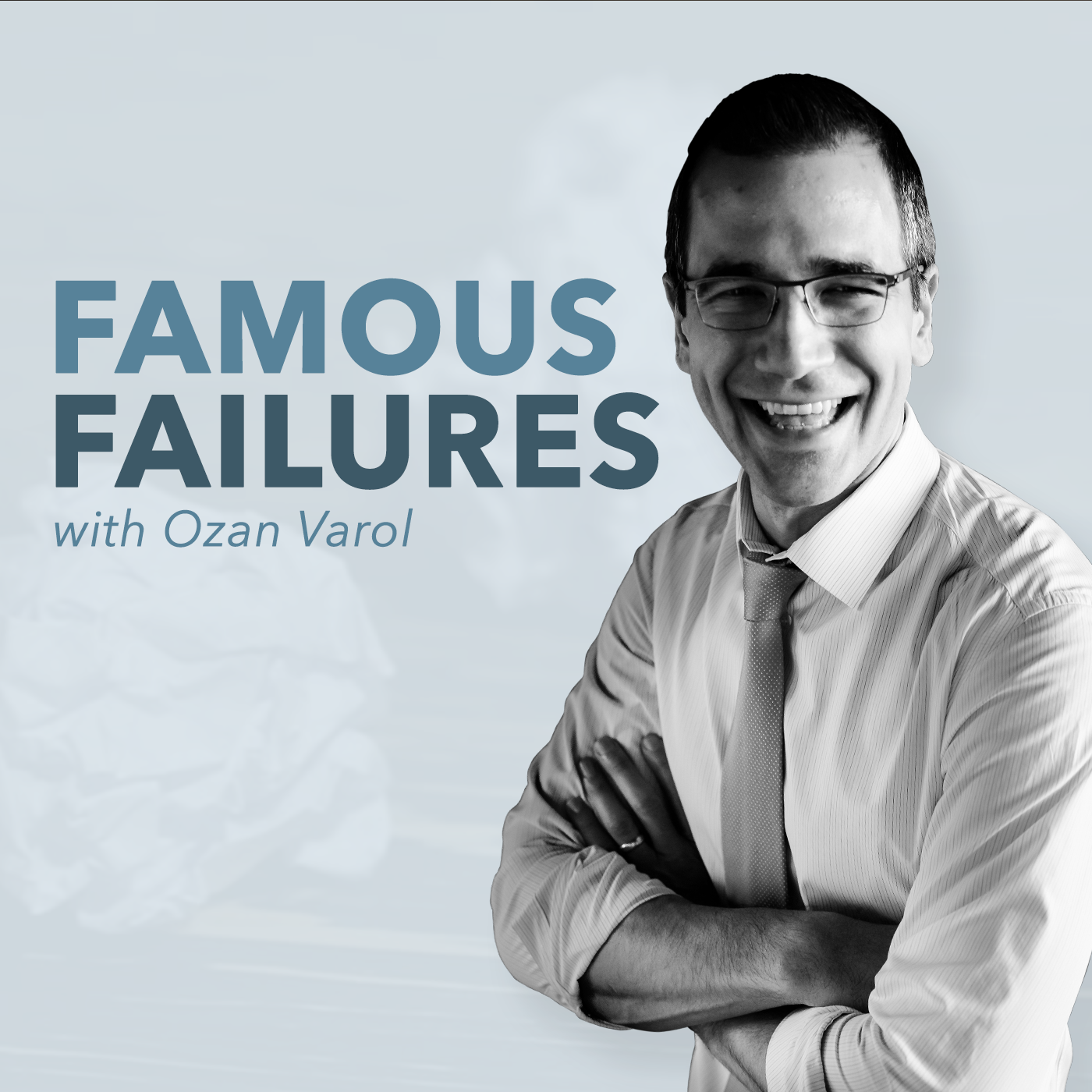
Famous FailuresTali Sharot on Our Power to Change OthersTali Sharot is a professor of cognitive neuroscience and a leading expert on the neural basis of emotion, decision making and optimism. She has been featured in numerous media outlets,including The New York Times, Time magazine, The Washington Post, CNN, BBC, and more. Her TED talk on the optimism bias was viewed over 2 million times. Her latest book, The Influential Mind: What the Brain Reveals About Our Power to Change Others, tackles the neuroscience behind influence -- what we so often get wrong about it, how we can learn to influence others, and how to understand...
2019-06-0437 min
Puthaga ParavaiReaders Guide - The Influential Mind - Tali SharotThe effect of our influence directly affected by our understanding of how human brain works when it takes information. If yoy want to understand gow we as humans take in information and also to know how to influence others, listen to this podcast on thr book "The influential Mind" by Tali Sharot
2019-05-1528 min
Changed My MindThe science behind changing minds with Professor Tali SharotTali Sharot, Professor of Cognitive Neuroscience at University College London and best selling author of The Optimism Bias and The Influential Mind joins us for this special episode of Changed My Mind to share her research on what the brain reveals about how beliefs are formed, what works to change others’ minds and what does not.
2019-01-0334 min
Changed My MindThe science behind changing minds with Professor Tali SharotTali Sharot, Professor of Cognitive Neuroscience at University College London and best selling author of The Optimism Bias and The Influential Mind joins us for this special episode of Changed My Mind to share her research on what the brain reveals about how beliefs are formed, what works to change others’ minds and what does not. Hosted on Acast. See acast.com/privacy for more information.
2019-01-0334 min
The Michael Shermer Show35. Dr. Tali Sharot — The Influential Mind: What the Brain Reveals About our Power to Change OthersIn her new book, The Influential Mind, neuroscientist Tali Sharot takes readers on a thrilling exploration of the nature of influence, so she and Shermer start the conversation by discussing how we can influence, for example, climate deniers to accept climate science, anti-vaxxers to accept vaccines, and creationists to accept evolution. As Sharot shows in her research, merely presenting people with the facts will not change their minds. There are other forces at work, which she reveals in this conversation and in more depth in her book. It turns out, for example, that many of our instincts—from relying on...
2018-08-2958 min
You Are Not So Smart135 - Optimism Bias (rebroadcast)In this episode, Tali Sharot, a cognitive neuroscientist and psychologist at University College London, explains our' innate optimism bias.When the brain estimates the outcome of future events, it tends to reduce the probability of negative outcomes for itself, but not so much for other people. In other words, if you are a smoker, everyone else is going to get cancer. The odds of success for a new restaurant change depending on who starts that venture, you or someone else. Sharot explains why and details how we can use our knowledge of this mental quirk to our...
2018-08-2739 min
The Politics GuysNeuroscientist Tali Sharot on Political Influence, Persuasion, and Donald Trump (Politics Plus)(There was a very short period in Mike’s life where he thought he could handle his teaching job, write a book, host The Politics Guys, and start a new podcast – Politics Plus. It soon became evident to Mike how insane trying to do all this at once was, and so he quickly shut down Politics Plus. But before he did, he’d posted four interviews – all of which he thinks are pretty good and are worth sharing with you as Politics Guys bonus episodes.) ***** ***** ***** Mike talks to Tali Sharot, director of the Affective Brain Lab and an A...
2018-08-1347 min
Soulfilled SisterhoodCreating Systems for business and home lifeHope Eden, LCSW, of The Organized Therapist, has a busy private practice in Asheville, NC. She has been licensed for over 16 years. Her experience includes being a shelter director, adult outpatient services supervisor, school-based counselor and outpatient service provider, in agencies, group practice settings and private practice. Hope is a Systems Thinker which helps in creating calm and flow both at home and at work. She can be found on Facebook as host for the following groups: The Organized Therapist, the Documentation Support Group for Mental Health Professionals and the Training Resource Group for Mental Health Professionals ...
2018-06-1237 min
Capital Allocators – Inside the Institutional Investment IndustryTali Sharot – Optimism, Decisions, and MistakesTali Sharot is a leading expert on human decision-making, optimism and emotion. A neuroscientist by trade, Tali combines research in psychology, behavioral economics and neuroscience to reveal the forces that shape our decisions, beliefs and inaccurate expectations of the future. She is currently a visiting professor at MIT, and is also an associate professor of Cognitive Neuroscience at University College London where she directs the Affective Brain Lab. Tali is the author of The Influential Mind, The Science of Optimism, and The Optimism Bias. Our conversation tackles many of the issues Tali has studied in her career, i...
2018-06-0447 min
Curious Minds at WorkCM 105: Tali Sharot On How To Change Someone’s MindCan facts change someone’s mind? Most times, this approach is a dead end, especially when we try to convince those with top-notch analytical skills. In fact, neuroscience shows that analytical people will tend to use data to find fault with facts they don’t like.
If we want to bring someone closer to our way of thinking, Tali Sharot suggests another way in her book, The Influential Mind: What the Brain Reveals about our Power to Change Others. Tali is founder and director of the Affective Brain Lab at University College London and an associate professor of cognitive neuroscience. Her...
2018-05-2041 min
The Matt Townsend ShowInfluential Mind, Depression and Dads, Birth Order and ParentingTali Sharot - The Influential Mind: What the Brain Reveals About Our Power to Change Others (19:54)
Tali Sharot, Ph.D., is an Associate Professor of Cognitive Neuroscience with degrees in economics and psychology. She is the founder and director of the Affective Brain Lab at University College London. She is the author of The Influential Mind: What the Brain Reveals About Our Power to Change Others. Changing how someone else thinks about an issue can be tough. Tali Sharot says that many of our instincts?from relying on facts and figures to shape opinions, to insisting others are wrong or a...
2018-01-252h 23
Entrepreneur WeeklySteve Sims, Tali Sharot, Ph.D & Chase JarvisBefore he was hobnobbing with the rich and famous, Steve Sims, worked as a humble doorman in Hong Kong. The modest Bluefish founder reveals his secret strategy to unlocking impossible opportunities and luxe experiences in his new book, Bluefishing. Then, Tali Sharot, Ph.D of the Affective Brain Lab at University College London, explains how to increase workplace motivation as we explore the enlightening discoveries chronicled in her latest work, The Influential Mind. Chase Jarvis of CreativeLive ends the show with a lesson on corporate storytelling (ie: advertising). Discover more. [00:00:00] Extra-ordinary: Bluefish Founder Steve Sims [00:06:28] How to Accomplish...
2017-09-2340 min
And Then It Hit Me with Cory Allen#103 Tali Sharot | The Influential MindNeuroscientist, TED talker, and author Tali Sharot joins me on The Astral Hustle. We discuss the nature of influence, how to avoid mental pitfalls by overriding elements that control the brain, and her new book The Influential Mind.★★★★★ Please manifest 5 stars and use them to rate The Astral Hustle on iTunes. It helps bring more of the guests you’d like to hear.
2017-09-1855 min
You Are Not So Smart105 - Optimism BiasIn this episode, Tali Sharot, a cognitive neuroscientist and psychologist at University College London, explains our' innate optimism bias. When the brain estimates the outcome of future events, it tends to reduce the probability of negative outcomes for itself, but not so much for other people. In other words, if you are a smoker, everyone else is going to get cancer. The odds of success for a new restaurant change depending on who starts that venture, you or someone else. Sharot explains why and details how we can use our knowledge of this mental quirk to our...
2017-07-1142 min
The Matt Townsend ShowOne Child Policy, Optimism Bias, Movies, Meet the ProducersChina's One Child Policy (18:35)(../../../episode/82c9998f-7004-4824-bd4f-5e1d50fd8bdb/the-matt-townsend-show-one-child-policy-optimism-bias-movies-meet-the-producers?playhead=1115&autoplay=true link)
Mei Fong is an author and journalist who graduated from the National University of Singapore she started her journalism career as a reporter. She has a Masters in International Affairs from Columbia University. Mei has worked for Forbes, The New York Times, and The Wall Street Journal where she won a shared Pulitzer for coverage of China’s transformative process ahead of the 2008 Beijing Olympics. Mei Fong is the author of "One Child: The Story of China's Most Radical Experiment" and wil...
2015-12-112h 14
TED ScienceTali Sharot: The optimism biasAre we born to be optimistic, rather than realistic? Tali Sharot shares new research that suggests our brains are wired to look on the bright side -- and how that can be both dangerous and beneficial. A video of this talk
2012-02-0117 min
TED ScienceTali Sharot: The optimism biasAre we born to be optimistic, rather than realistic? Tali Sharot shares new research that suggests our brains are wired to look on the bright side -- and how that can be both dangerous and beneficial. A video of this talk
2012-02-0117 min
Explore Your Favorite Digital Audiobooks TodayEnjoy The Optimism Bias from Tali SharotPlease visit https://thebookvoice.com/podcasts/2/audible/163768 to listen full audiobooks.
Publisher's Summary: From one of the most innovative neuroscientists at work today, an investigation into the bias toward optimism that exists on a neural level in our brains and plays a major part in determining how we live our lives.
Title: The Optimism Bias
Author: Tali Sharot
Narrator: Susan Denaker
Format: mp3
Length: 8 hrs and 13 mins
Release date: 06-14-11
Ratings: 4 out of 5 stars, 65 ratings
Genres: Science
2011-06-148h 13
Get Lost In The Best-Selling Full Audiobook Now, Knowledge Hunters!The Optimism Bias by Tali SharotPlease visithttps://thebookvoice.com/podcasts/2/audible/163768to listen full audiobooks.
Title: The Optimism Bias
Author: Tali Sharot
Narrator: Susan Denaker
Format: mp3
Length: 8 hrs and 13 mins
Release date: 06-14-11
Ratings: 4 out of 5 stars, 65 ratings
Genres: Science
Publisher's Summary:
From one of the most innovative neuroscientists at work today, an investigation into the bias toward optimism that exists on a neural level in our brains and plays a major part in determining how we live our lives.
2011-06-148h 13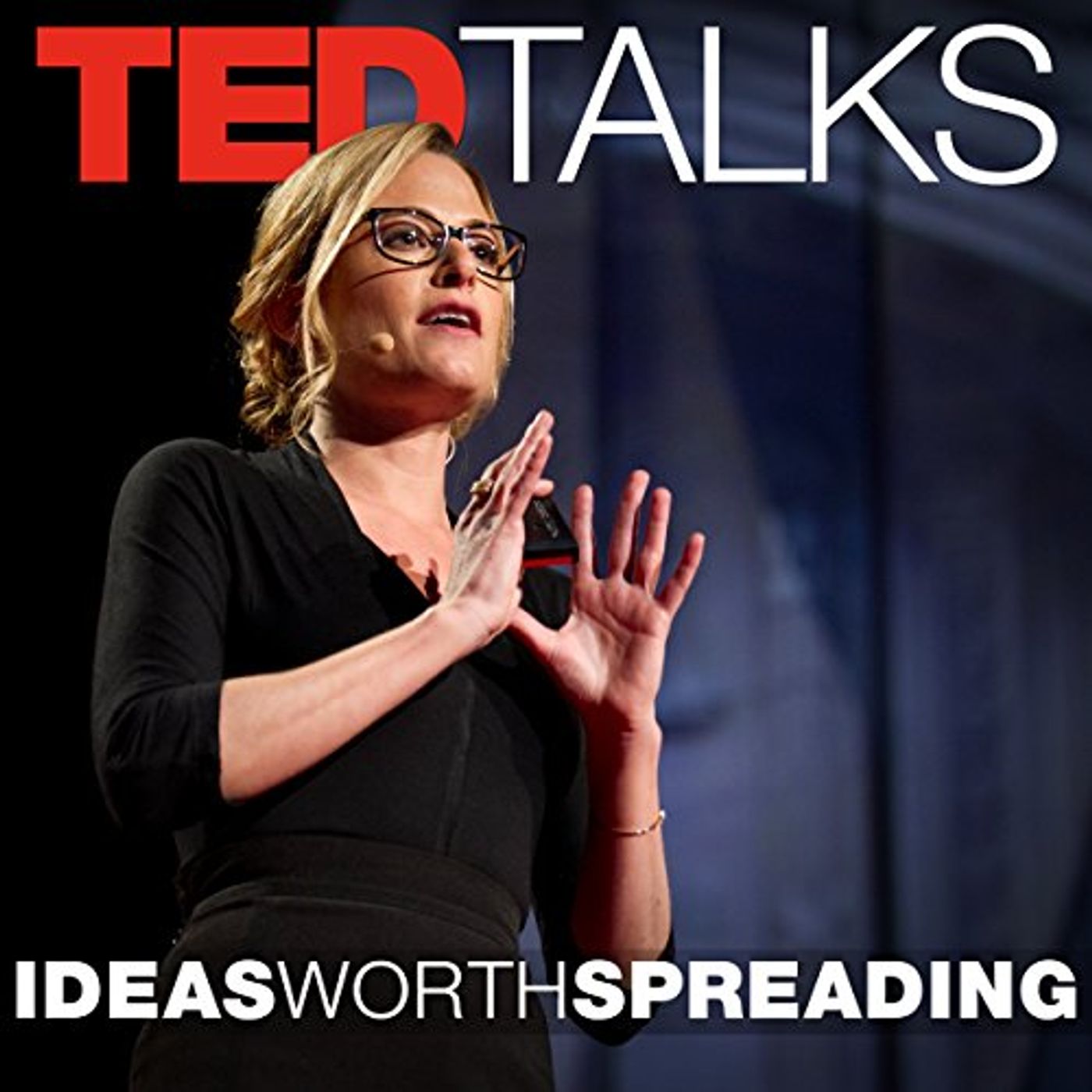
Get Top 100 Audiobooks in Language InstructionThe Optimism Bias Audiobook by Tali SharotPlease visit https://fashabooks.com/aff/fashabooks/114 to download full audiobooks of your choice for free. Title: The Optimism Bias Author: Tali Sharot Narrator: Tali Sharot Format: Original Recording Length: 17 mins Language: English Release date: 12-30-00 Publisher: TED Talks Genres: Live Events, Culture Publisher's Summary: Are we born to be optimistic, rather than realistic? Tali Sharot shares new research that suggests our brains are wired to look on the bright side - and how that can be both dangerous and beneficial.
2000-12-3001 min